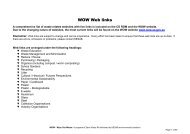WOW in Curriculum.pdf - Wipe Out Waste - WOW
WOW in Curriculum.pdf - Wipe Out Waste - WOW
WOW in Curriculum.pdf - Wipe Out Waste - WOW
Create successful ePaper yourself
Turn your PDF publications into a flip-book with our unique Google optimized e-Paper software.
Investigate how much food is wasted from your<br />
school. Discuss the range of issues associated with food<br />
waste. Suggest ways of reduc<strong>in</strong>g this amount. Arrange a<br />
time to discuss your fi nd<strong>in</strong>gs and recommendations with<br />
the Canteen Manager or Parent Committee and agree on<br />
appropriate action to reduce the amount of food waste.<br />
Monitor the amount of organic material from your<br />
school. Research different types of compost<strong>in</strong>g systems,<br />
compar<strong>in</strong>g their benefi ts and disadvantages <strong>in</strong> a school<br />
sett<strong>in</strong>g.<br />
▼ Design a compost<strong>in</strong>g system for your school and<br />
enlist support from the community (eg parent help,<br />
local council support, bus<strong>in</strong>ess donation of materials).<br />
If your school generates lots of large garden material,<br />
could some of this be shredded or chipped for<br />
mulch?<br />
▼ If you already have a compost<strong>in</strong>g system, how would<br />
you improve the management of the system?<br />
▼ Develop and implement a campaign to <strong>in</strong>form the<br />
school community about your system.<br />
Research the science of a compost system (eg<br />
the role of bacteria, the suitability of worm compost<strong>in</strong>g,<br />
aerobic / anaerobic processes). How will this research<br />
assist you to manage a compost system <strong>in</strong> your school?<br />
Develop a fl ow chart to illustrate the transfer and<br />
transformation of material and energy through a food web<br />
<strong>in</strong> a compost or worm compost system. Display near your<br />
school compost or worm compost system.<br />
Valuable material for compost<strong>in</strong>g<br />
Suggested Learn<strong>in</strong>g Activities<br />
Middle / Senior Years<br />
Design an experiment to compare the success of<br />
plants grown <strong>in</strong> humus (fi nished compost), worm cast<strong>in</strong>gs<br />
and normal soil. Discuss the results of your compost<strong>in</strong>g<br />
experiments and how can this <strong>in</strong>formation can be used <strong>in</strong><br />
the school. Report your fi nd<strong>in</strong>gs and recommendations to<br />
the school community.<br />
Expla<strong>in</strong> the role of macro and micro-organisms <strong>in</strong><br />
convert<strong>in</strong>g organic waste <strong>in</strong>to nutrient-rich soil. Test<br />
factors which affect decomposition of organic material <strong>in</strong><br />
a compost system. Relate this to your school compost<strong>in</strong>g<br />
system to improve its effi ciency.<br />
Investigate the local compost <strong>in</strong>dustry to fi nd out<br />
which products are be<strong>in</strong>g produced, their uses and<br />
employment opportunities. What relationships could exist<br />
between this <strong>in</strong>dustry and your school?<br />
Research the suitability of <strong>in</strong>vasive or noxious weeds<br />
for compost<strong>in</strong>g and any measures that you might take to<br />
prevent the spread of these weeds through composted<br />
material. How will this <strong>in</strong>formation affect your compost<strong>in</strong>g<br />
practices?<br />
An effective school compost collection system<br />
<strong>WOW</strong> - <strong>Wipe</strong> <strong>Out</strong> <strong>Waste</strong>: A program of Zero <strong>Waste</strong> SA delivered by KESAB environmental solutions<br />
4



